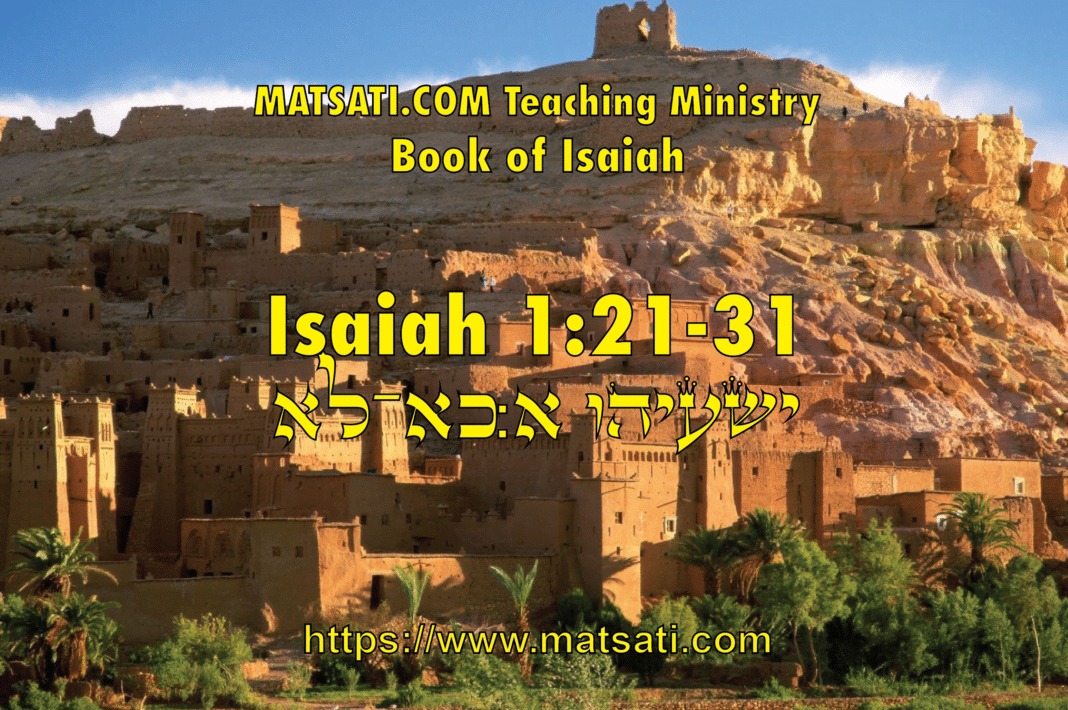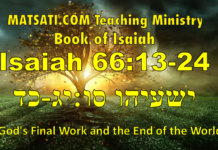Table of Contents
Introduction to Isaiah 1:21-31
Isaiah asks a very important question according to Isaiah 1:21.

ספר ישעיה פרק א
כא אֵיכָה֙ הָיְתָ֣ה לְזוֹנָ֔ה קִרְיָ֖ה נֶאֱמָנָ֑ה מְלֵאֲתִ֣י מִשְׁפָּ֗ט צֶ֛דֶק יָלִ֥ין בָּ֖הּ וְעַתָּ֥ה מְרַצְּחִֽים׃
Isaiah 1:21 states “How is the faithful city become an harlot! (אֵיכָה֙ הָיְתָ֣ה לְזוֹנָ֔ה קִרְיָ֖ה נֶאֱמָנָ֑ה) it was full of judgment; (מְלֵאֲתִ֣י מִשְׁפָּ֗ט) righteousness lodged in it; (צֶ֛דֶק יָלִ֥ין בָּ֖הּ) but now murderers. (וְעַתָּ֥ה מְרַצְּחִֽים)” We note how the prophet Hosea overlaps with the prophet Isaiah at the beginning. This idea of the holy city Jerusalem being a harlot is consistent with Hosea’s prophetic ministry. God commanded Hosea to marry a prostitute due to Israel’s harlotry towards God. As history bears out, Israel and Jerusalem’s destruction couldn’t be averted. Ultimately the Lord wants to purify the people, calling them back to His ways. The current situation is the murderous people who dwell there. This is why Isaiah said אֵיכָה֙ הָיְתָ֣ה “how can it be?” lamenting over the peoples sin. The condition of Jerusalem and Israel as a whole is called לְזוֹנָ֔ה קִרְיָ֖ה נֶאֱמָנָ֑ה “faithful city/town that is a prostitute.” The allusion is to Israel departing from God, seeing other gods, as Hosea calls it, seeking other lovers. (Hosea 2:2, 3:1) God is defined as her husband, and is calling her to keep faithfulness to Him. This draws in the Torah context of obedience versus disobedience, life versus death! Isaiah says “it was full of judgment; (מְלֵאֲתִ֣י מִשְׁפָּ֗ט) righteousness lodged in it; (צֶ֛דֶק יָלִ֥ין בָּ֖הּ)” The idea is centered on מִשְׁפָּ֗ט “justice” and צֶ֛דֶק “righteousness” which are supposed to be the characteristics of those who keep faith with God because these things are part of His character!
ספר ישעיה פרק א
כב כַּסְפֵּ֖ךְ הָיָ֣ה לְסִיגִ֑ים סָבְאֵ֖ךְ מָה֥וּל בַּמָּֽיִם׃ כג שָׂרַ֣יִךְ סוֹרְרִ֗ים וְחַבְרֵי֙ גַּנָּבִ֔ים כֻּלּוֹ֙ אֹהֵ֣ב שֹׁ֔חַד וְרֹדֵ֖ף שַׁלְמֹנִ֑ים יָתוֹם֙ לֹ֣א יִשְׁפֹּ֔טוּ וְרִ֥יב אַלְמָנָ֖ה לֹֽא־יָב֥וֹא אֲלֵיהֶֽם׃ פ
Isaiah continues saying in Isaiah 1:22 “Thy silver (כַּסְפֵּ֖ךְ) is become dross, (הָיָ֣ה לְסִיגִ֑ים) thy wine mixed with water: (סָבְאֵ֖ךְ מָה֥וּל בַּמָּֽיִם)” and Isaiah 1:23, “Thy princes are rebellious, (שָׂרַ֣יִךְ סוֹרְרִ֗ים) and companions of thieves: (וְחַבְרֵי֙ גַּנָּבִ֔ים) every one loveth gifts, (כֻּלּוֹ֙ אֹהֵ֣ב שֹׁ֔חַד) and followeth after rewards: (וְרֹדֵ֖ף שַׁלְמֹנִ֑ים) they judge not the fatherless, (יָתוֹם֙ לֹ֣א יִשְׁפֹּ֔טוּ) neither doth the cause of the widow come unto them. (וְרִ֥יב אַלְמָנָ֖ה לֹֽא־יָב֥וֹא אֲלֵיהֶֽם)” The concept of silver becoming dross (כַּסְפֵּ֖ךְ הָיָ֣ה לְסִיגִ֑ים), this reminds us of the purification process again, when metals are heated the waste or impurities float to the surface and then scraped off and cast away as waste. This is what happens in the steel making process, where the dross is called “slag” a waste product that depending upon the raw starting materials may contain toxins such as vanadium, arsenic, nickel, and other toxic elements to the environment. When slag is deposited into a landfill, the slag begins the slow process of carbonization via the atmospheric CO2 and rain water. The CO2 + water forms an acid, which may leach out these toxins and cause them to flow into the groundwater and poison the local peoples. This is an interesting analogy as Isaiah stated back in Isaiah 1:4, “Ah (הוֹי) sinful nation, a people laden with iniquity (גּוֹי חֹטֵא עַם כֶּבֶד עָוֹן), a seed of evildoers (זֶרַע מְרֵעִים), children that are corrupters (בָּנִים מַשְׁחִיתִים): they have forsaken the Lord (עָזְבוּ אֶת-יְהֹוָה), they have provoked the Holy One of Israel unto anger (נִאֲצוּ אֶת-קְדוֹשׁ יִשְֹרָאֵל), they are gone away backward. (נָזֹרוּ אָחוֹר)“ The statement בָּנִים מַשְׁחִיתִים “children of corruption” functions in a similar fashion, as corrupting those around them. The analogy is in the dross which has the capability of toxicity and chronic illness and even death. The leaders are called rebellious (סוֹרְרִ֗ים), thieves (גַּנָּבִ֔ים), and love bribes (שֹׁ֔חַד) and pursues after bribes (וְרֹדֵ֖ף שַׁלְמֹנִ֑ים) to such an extent as they do not do justice to the orphan and the widow. Note the Torah context here! (i.e. “Don’t cause anguish to any widow or orphan” see Shemot / Exodus 22:21) The mentioning of silver and then injustice, seems to suggest the people followed their own greed leading to the outcome of promoting injustice in the land. Notice how Isaiah relates idolatry to social justice (Isaiah 29:17-21, 46:5-13, 48:17-18, 56:9-57:12), and the other prophets also mention this connection frequently (Jeremiah 23:13-14, Ezekiel 16:47-52, Hosea 4:1-14, Amos 2:6-8, and Malachi 3:5). The prophets say that this injustice is the result of not trusting in the God of Israel who is just and merciful. Notice how this is a continuing theme throughout all of Scripture, that we are to trust in the Lord God Almighty, and not in man! (see Jeremiah 17:5-10) The creator God holds each and every man, woman, and child with great value, this is the significance of our being created in His image (Torah perspective). When one leaves from serving and seeking the God of Israel, one loses this perspective and the end result is the devaluation of human beings. This is the ultimate outcome of walking away from God’s truth, which leads to injustice, as Isaiah is describing here. This is the underlying attitude behind the sin of idolatry! The point of the Torah is to surrender our lives to God, to His ways, and seeking His help to love one another, to be merciful, to do justice, and to live holy and righteous before God. Just like the sacrificial system was meant for one to demonstrate his or her faithfulness to God and the covenant. It was not about earning one’s own salvation! For these things we need God’s help, especially in terms of remaining faithful to God. This is accomplished through the promise of God by faith in Yeshua and the presence of God dwelling in our hearts via His Holy Spirit!
ספר ישעיה פרק א
כד לָכֵ֗ן נְאֻ֤ם הָֽאָדוֹן֙ יְהוָ֣ה צְבָא֔וֹת אֲבִ֖יר יִשְׂרָאֵ֑ל ה֚וֹי אֶנָּחֵ֣ם מִצָּרַ֔י וְאִנָּקְמָ֖ה מֵאוֹיְבָֽי׃
Isaiah 1:24 continues saying, “Therefore saith the LORD, the LORD of hosts, (לָכֵ֗ן נְאֻ֤ם הָֽאָדוֹן֙ יְהוָ֣ה צְבָא֔וֹת) the mighty One of Israel, (אֲבִ֖יר יִשְׂרָאֵ֑ל) Ah, I will ease me of mine adversaries, (ה֚וֹי אֶנָּחֵ֣ם מִצָּרַ֔י) and avenge me of mine enemies: (וְאִנָּקְמָ֖ה מֵאוֹיְבָֽי)” Here Isaiah describes God as the mighty one (אֲבִ֖יר) of Israel (יִשְׂרָאֵ֑ל), the One who is able to do all things. Isaiah combines הָֽאָדוֹן֙ יְהוָ֣ה צְבָא֔וֹת with אֲבִ֖יר יִשְׂרָאֵ֑ל to indicate God’s overarching authority overall. The question would be, who would be so foolish to defy the Almighty God? This phrase אֲבִ֖יר יִשְׂרָאֵ֑ל “mighty one of Israel” occurs elsewhere in Bereshit / Genesis 49:24, Isaiah 49:26, 60:16, Tehillim / Psalms 132:2 and 132:5. This describes the power of God, and note how Isaiah says ה֚וֹי “woe” אֶנָּחֵ֣ם I will will comfort or regret myself of mine adversaries (מִצָּרַ֔י) and that He will avenge Himself of His enemies (וְאִנָּקְמָ֖ה מֵאוֹיְבָֽי) and the Lord is able, or powerful enough to do this. It is unfortunate that Israel herself has become His enemy due to her unrepentant sin. The idea is that those who do the will of God walking in His ways, will be His children. Whereas, those who rebel against Him are his enemies.
ספר ישעיה פרק א
כה וְאָשִׁ֤יבָה יָדִי֙ עָלַ֔יִךְ וְאֶצְרֹ֥ף כַּבֹּ֖ר סִיגָ֑יִךְ וְאָסִ֖ירָה כָּל־בְּדִילָֽיִךְ׃ כו וְאָשִׁ֤יבָה שֹׁפְטַ֙יִךְ֙ כְּבָרִ֣אשֹׁנָ֔ה וְיֹעֲצַ֖יִךְ כְּבַתְּחִלָּ֑ה אַחֲרֵי־כֵ֗ן יִקָּ֤רֵא לָךְ֙ עִ֣יר הַצֶּ֔דֶק קִרְיָ֖ה נֶאֱמָנָֽה׃
Isaiah 1:25 states, “And I will turn my hand upon thee, (וְאָשִׁ֤יבָה יָדִי֙ עָלַ֔יִךְ) and purely purge away thy dross, (וְאֶצְרֹ֥ף כַּבֹּ֖ר סִיגָ֑יִךְ) and take away all thy tin: (וְאָסִ֖ירָה כָּל־בְּדִילָֽיִךְ),” Isaiah 1:26 “And I will restore thy judges as at the first, (וְאָשִׁ֤יבָה שֹׁפְטַ֙יִךְ֙ כְּבָרִ֣אשֹׁנָ֔ה) and thy counsellors as at the beginning: (וְיֹעֲצַ֖יִךְ כְּבַתְּחִלָּ֑ה) afterward thou shalt be called, (אַחֲרֵי־כֵ֗ן יִקָּ֤רֵא לָךְ֙) The city of righteousness, the faithful city. (עִ֣יר הַצֶּ֔דֶק קִרְיָ֖ה נֶאֱמָנָֽה)“ These two verses begin with the word וְאָשִׁ֤יבָה which provides the meaning of turning with the feeling of repentance. This word is written in the Hiphil causative meaning “to return.” The idea is “I will turn my hand upon you” (וְאָשִׁ֤יבָה יָדִי֙ עָלַ֔יִךְ) and “I will turn my judges as at first” (וְאָשִׁ֤יבָה שֹׁפְטַ֙יִךְ֙ כְּבָרִ֣אשֹׁנָ֔ה). There seems to be a contrast here on the one hand the Lord will put His hand upon the people, and on the other hand the Lord will return His judges meaning that he will purify them. This demonstrates the mercy of God, His desire to draw near to a faithful people. Based upon Isaiah 1:25-26, the phrase וְאָשִׁ֤יבָה יָדִי֙ עָלַ֔יִךְ is said in relation to not Israel’s destruction but for her restoration. Isaiah saying “purge away thy dross, (וְאֶצְרֹ֥ף כַּבֹּ֖ר סִיגָ֑יִךְ) and take away all thy tin (וְאָסִ֖ירָה כָּל־בְּדִילָֽיִךְ)“ meaning the Lord will begin the work of refining and purifying. Notice this is something the Lord God Almighty is doing in our lives! Isaiah is not giving a mechanistic approach to purity. He is saying the Lord God is calling each and every one of us to repent! These appear to be encouraging words. Isaiah then saying “afterward thou shalt be called, (אַחֲרֵי־כֵ֗ן יִקָּ֤רֵא לָךְ֙) The city of righteousness, the faithful city (עִ֣יר הַצֶּ֔דֶק קִרְיָ֖ה נֶאֱמָנָֽה)“ means that the people will return to Torah at a point in the future. It may be that Isaiah is pointing out the immoral state of Israel, while believing that she will return to the ways of God by the help of God. Here Isaiah looks at how the Lord will deliver His people, and the idea is by going through the fire one will be refined like silver and gold. We note that there is no mention of a Messianic redeemer, who shows Israel the way of God. We note however that the statement וְאָשִׁ֤יבָה שֹׁפְטַ֙יִךְ֙ כְּבָרִ֣אשֹׁנָ֔ה speaks to the restoration of a righteous judge who will rule with impartiality and govern the people with justice and truth. These words in and of themselves may have drawn the Hebrew people to a messianic expectation of a king who would one day govern in justice, righteousness, and peace.
ספר ישעיה פרק א
כז צִיּ֖וֹן בְּמִשְׁפָּ֣ט תִּפָּדֶ֑ה וְשָׁבֶ֖יהָ בִּצְדָקָֽה׃ כח וְשֶׁ֧בֶר פֹּשְׁעִ֛ים וְחַטָּאִ֖ים יַחְדָּ֑ו וְעֹזְבֵ֥י יְהוָ֖ה יִכְלֽוּ׃
Isaiah 1:27 states, “Zion shall be redeemed with judgment, (צִיּ֖וֹן בְּמִשְׁפָּ֣ט תִּפָּדֶ֑ה) and her converts with righteousness. (וְשָׁבֶ֖יהָ בִּצְדָקָֽה)“ Isaiah 1:28 “And the destruction of the transgressors and of the sinners (וְשֶׁ֧בֶר פֹּשְׁעִ֛ים וְחַטָּאִ֖ים) shall be together, (יַחְדָּ֑ו) and they that forsake the LORD shall be consumed. (וְעֹזְבֵ֥י יְהוָ֖ה יִכְלֽוּ)“ The word Zion (צִיּ֖וֹן) is mentioned 152 times in the Hebrew Bible (Tanakh), most often in the Prophetic books, the Book of Psalms, and the Book of Lamentations, besides six mentions in the Historical books (Kings, Samuel, Chronicles) and a single mention of the “daughters of Zion” in the Song of Songs (3:11) Out of the 152 mentions, 26 instances are within the phrase of “Daughter of Zion” (bat Tzion). This is a personification of the city of Jerusalem, or maybe a reference to its population. The term Zion came to designate the area of Davidic Jerusalem where the fortress stood. Here Isaiah says צִיּ֖וֹן בְּמִשְׁפָּ֣ט תִּפָּדֶ֑ה “Zion will be redeemed in justice” which is consistent with our earlier interpretation of God not seeking utter destruction of Israel but of her eventual restoration. The word צִיּ֖וֹן (Zion) occurs 47 times in Isaiah. That is 30% of the occurrences of Zion is in the book of Isaiah. This name alone draws us back to David and God’s calling on his life to lead Israel, to go out and conquer the enemies of Israel, and to prepare for the building of the holy Temple in Jerusalem, and remain faithful to God and walk in His Torah. The positive nature of this verse is that Zion will be redeemed (צִיּ֖וֹן בְּמִשְׁפָּ֣ט תִּפָּדֶ֑ה). Note the broad analogies that are made from the Torah in Isaiah 1, that goes as far back as with Abraham, Lot, and Sodom and Gomorrah. These things remind us of how Abraham prayed for Sodom and the people that there would be enough righteous men that the city and the region would be saved. We note the reason why God speaking through Isaiah wrote of redemption (תִּפָּדֶ֑ה) here in the very first chapter of Isaiah, the reason being, the Lord is always seeking for His people to repent and turn from their sins! Searching for occurrences of the lemma: פדה in the LHB produces the following results.

Isaiah 1:27
צִיּ֖וֹן בְּמִשְׁפָּ֣ט תִּפָּדֶ֑ה וְשָׁבֶ֖יהָ בִּצְדָקָֽה׃
Isaiah 29:22
לָכֵ֗ן כֹּֽה־אָמַ֤ר יְהוָה֙ אֶל־בֵּ֣ית יַֽעֲקֹ֔ב אֲשֶׁ֥ר פָּדָ֖ה אֶת־אַבְרָהָ֑ם לֹֽא־עַתָּ֤ה יֵבוֹשׁ֙ יַֽעֲקֹ֔ב וְלֹ֥א עַתָּ֖ה פָּנָ֥יו יֶחֱוָֽרוּ׃
Isaiah 35:10
וּפְדוּיֵ֨י יְהוָ֜ה יְשֻׁב֗וּן וּבָ֤אוּ צִיּוֹן֙ בְּרִנָּ֔ה וְשִׂמְחַ֥ת עוֹלָ֖ם עַל־רֹאשָׁ֑ם שָׂשׂ֤וֹן וְשִׂמְחָה֙ יַשִּׂ֔יגוּ וְנָ֖סוּ יָג֥וֹן וַאֲנָחָֽה׃
Isaiah 51:11
וּפְדוּיֵ֨י יְהוָ֜ה יְשׁוּב֗וּן וּבָ֤אוּ צִיּוֹן֙ בְּרִנָּ֔ה וְשִׂמְחַ֥ת עוֹלָ֖ם עַל־רֹאשָׁ֑ם שָׂשׂ֤וֹן וְשִׂמְחָה֙ יַשִּׂיג֔וּן נָ֖סוּ יָג֥וֹן וַאֲנָחָֽה׃
In Isaiah 29:22 the prophet Isaiah speaks of God’s redemption of Abraham. Both Isaiah 35:10 and 51:11 speak of the joy of the redeemed. We note how it is through the grace of God that this gift of redemption comes! This illustrates again how God’s grace is present throughout all of Scripture, from Genesis to Revelation! It is by the gracious gift of God that a man is counted righteous in His sight! We also must remember the cooperative role that we have in remaining faithful before God, something we should also be seeking from the Lord. Isaiah 56:1 states, “Maintain justice and do what is right, for my salvation is close at hand and my righteousness will soon be revealed.” This draws us back to the Torah from the sense of God calling His people to live in His ways (truth, justice, peace, mercy, righteousness, and holiness) and the role God plays in giving us the motivation to live for Him! Those who rebel against the Lord will be as Isaiah states in Isaiah 1:28 “And the destruction of the transgressors and of the sinners (וְשֶׁ֧בֶר פֹּשְׁעִ֛ים וְחַטָּאִ֖ים) shall be together, (יַחְדָּ֑ו) and they that forsake the LORD shall be consumed. (וְעֹזְבֵ֥י יְהוָ֖ה יִכְלֽוּ)“ Remember, the goal or target of the command is to direct us to the Messiah! Those who rebel against God’s commands, will miss the mark, they will miss the target, the ultimate goal, which is to have faith in Yeshua the Messiah!
ספר ישעיה פרק א
כט כִּ֣י יֵבֹ֔שׁוּ מֵאֵילִ֖ים אֲשֶׁ֣ר חֲמַדְתֶּ֑ם וְתַ֨חְפְּר֔וּ מֵהַגַּנּ֖וֹת אֲשֶׁ֥ר בְּחַרְתֶּֽם׃ ל כִּ֣י תִֽהְי֔וּ כְּאֵלָ֖ה נֹבֶ֣לֶת עָלֶ֑הָ וּֽכְגַנָּ֔ה אֲשֶׁר־מַ֖יִם אֵ֥ין לָֽהּ׃
Isaiah 1:29 states, “For they shall be ashamed of the oaks which ye have desired, (כִּ֣י יֵבֹ֔שׁוּ מֵאֵילִ֖ים אֲשֶׁ֣ר חֲמַדְתֶּ֑ם) and ye shall be confounded for the gardens that ye have chosen. (וְתַ֨חְפְּר֔וּ מֵהַגַּנּ֖וֹת אֲשֶׁ֥ר בְּחַרְתֶּֽם)” and Isaiah 1:30 states, “For ye shall be as an oak whose leaf fadeth, (כִּ֣י תִֽהְי֔וּ כְּאֵלָ֖ה נֹבֶ֣לֶת עָלֶ֑הָ) and as a garden that hath no water. (וּֽכְגַנָּ֔ה אֲשֶׁר־מַ֖יִם אֵ֥ין לָֽהּ)” The prophet is making it clear the idolatry the people committed. The issue is the people thought they could mingle the worship of foreign gods with the worship of the God of Israel. Note how this has been the issue for quite some time; their mingling of their faith with other gods spans Jeremiah 1:16, 9:13-14, Ezekiel 20:8, and Hosea 4:10. Isaiah says יֵבֹ֔שׁוּ מֵאֵילִ֖ים אֲשֶׁ֣ר חֲמַדְתֶּ֑ם “ashamed of the oaks which you have desired” here the word translated oaks מֵאֵילִ֖ים the word means “tall trees” and so these oaks, may be a reference to the groves in which they worshiped their false gods. Groves are the location of where the nations kept their Ashera (singular) or Asherim (plural). These were idols of the Phenician gods. The Torah and prophets forbid their construction according to Devarim / Deuteronomy 16:21, Isaiah 1:29, 17:8; 27:9, and Micah 5:14. The scriptures state that Israel worshiped these false gods according to Judges 3:7, 1 Kings 14:15, 1 Kings 14:23, 1 Kings 15:13, 1 Kings 18:19, 2 Kings 13:6, 2 Kings 17:10, 2 Kings 17:16, 2 Kings 21:3-7, 2 Chronicles 24:18, Jeremiah 17:2. These idols were destroyed by the following people, Gideon in Judges 6:28, Hezekiah in 2 Kings 18:4, Josiah according to 2 Kings 23:14 and 2 Chronicles 34:3-4, Asa in 2 Chronicles 14:3 and Jehoshaphat according to 2 Chronicles 17:6 and 2 Chronicles 19:3. This interpretation is consistent with the remainder of the verse saying, “and ye shall be confounded for the gardens that ye have chosen. (וְתַ֨חְפְּר֔וּ מֵהַגַּנּ֖וֹת אֲשֶׁ֥ר בְּחַרְתֶּֽם).” There is great shame in flowing false gods made of wood and stone. There is a very important principle that is taught here, what a person worships so that person will become. The idea is if we serve and worship God we will take on his character. The Lord God Almighty is the creator, He is our life as He is the Living God. The false gods have no life, they have no power, they are manufactured and worthless. These things remind us of the Torah command to turn from idolatry and flee from it. To not walk in the way of the nation’s, but to walk in the way of God according to His Word!
ספר ישעיה פרק א
לא וְהָיָ֤ה הֶחָסֹן֙ לִנְעֹ֔רֶת וּפֹעֲל֖וֹ לְנִיצ֑וֹץ וּבָעֲר֧וּ שְׁנֵיהֶ֛ם יַחְדָּ֖ו וְאֵ֥ין מְכַבֶּֽה׃
Isaiah 1:31 states, “And the strong shall be as tow, (וְהָיָ֤ה הֶחָסֹן֙ לִנְעֹ֔רֶת) and the maker of it as a spark, (וּפֹעֲל֖וֹ לְנִיצ֑וֹץ) and they shall both burn together, (וּבָעֲר֧וּ שְׁנֵיהֶ֛ם יַחְדָּ֖ו) and none shall quench them. (וְאֵ֥ין מְכַבֶּֽה)“ Here Isaiah describes the strong (הֶחָסֹן֙) as tinder (לִנְעֹ֔רֶת) what the KJV calls “tow” which is another way of calling the strong “chaff” (מוץ) which is used to get a fire burning at first. The one who makes the spark which is then kindled to make the fire וּפֹעֲל֖וֹ לְנִיצ֑וֹץ here the word לְנִיצ֑וֹץ is a hapax legomenon which is a word or an expression that occurs only once within a context: either in the written record of an entire language, in the works of an author, or in a single text. This phrase of the one who makes the “spark” coupled with the strong becoming like chaff / tinder / tow, suggests that the Lord will destroy the pride in man. All of these analogies appear to be Torah centric, drawing us back to the Torah and the words of David. Such as the Psalmist’s words in Tehillim / Psalms 1.

Tehillim / Psalms 1:1-6
1:1 Blessed is the man that walketh not in the counsel of the ungodly, nor standeth in the way of sinners, nor sitteth in the seat of the scornful. 1:2 But his delight is in the law of the LORD; and in his law doth he meditate day and night. 1:3 And he shall be like a tree planted by the rivers of water, that bringeth forth his fruit in his season; his leaf also shall not wither; and whatsoever he doeth shall prosper. 1:4 The ungodly are not so: but are like the chaff which the wind driveth away. 1:5 Therefore the ungodly shall not stand in the judgment, nor sinners in the congregation of the righteous. 1:6 For the LORD knoweth the way of the righteous: but the way of the ungodly shall perish. (KJV, אַ֥שְֽׁרֵי־הָאִ֗ישׁ אֲשֶׁ֤ר׀ לֹ֥א הָלַךְ֮ בַּעֲצַ֪ת רְשָׁ֫עִ֥ים וּבְדֶ֣רֶךְ חַ֭טָּאִים לֹ֥א עָמָ֑ד וּבְמוֹשַׁ֥ב לֵ֝צִ֗ים לֹ֣א יָשָֽׁב׃ כִּ֤י אִ֥ם בְּתוֹרַ֥ת יְהוָ֗ה חֶ֫פְצ֥וֹ וּֽבְתוֹרָת֥וֹ יֶהְגֶּ֗ה יוֹמָ֥ם וָלָֽיְלָה׃ וְֽהָיָ֗ה כְּעֵץ֮ שָׁת֪וּל עַֽל־פַּלְגֵ֫י מָ֥יִם אֲשֶׁ֤ר פִּרְיֹ֨ו׀ יִתֵּ֬ן בְּעִתּ֗וֹ וְעָלֵ֥הוּ לֹֽא־יִבּ֑וֹל וְכֹ֖ל אֲשֶׁר־יַעֲשֶׂ֣ה יַצְלִֽיחַ׃ לֹא־כֵ֥ן הָרְשָׁעִ֑ים כִּ֥י אִם־כַּ֝מֹּ֗ץ אֲֽשֶׁר־תִּדְּפֶ֥נּוּ רֽוּחַ׃ עַל־כֵּ֤ן׀ לֹא־יָקֻ֣מוּ רְ֭שָׁעִים בַּמִּשְׁפָּ֑ט וְ֝חַטָּאִ֗ים בַּעֲדַ֥ת צַדִּיקִֽים׃ כִּֽי־יוֹדֵ֣עַ יְ֭הוָה דֶּ֣רֶךְ צַדִּיקִ֑ים וְדֶ֖רֶךְ רְשָׁעִ֣ים תֹּאבֵֽד׃)
Here David opens with the words to not walk in the counsel of the ungodly, not stand in the way of the sinners, nor sit in the seat of the scornful, but to meditate upon the Torah of God day and night. Like David, Isaiah calls for God’s people to return to truth, righteousness, and holiness according to God’s Word. Here he describes the ungodly saying לֹא־כֵ֥ן הָרְשָׁעִ֑ים כִּ֥י אִם־כַּ֝מֹּ֗ץ אֲֽשֶׁר־תִּדְּפֶ֥נּוּ רֽוּחַ “not so for the wicked, they will be like chaff that is blown by the wind.” The idea here is our sufficiency is in the Lord and not in ourselves. This is why Isaiah says the mighty, the strong will burn because they trust in themselves as opposed to trusting in the one who is Lord over all and the source of life itself!
Rabbinic Commentary

The Targum translation of Isaiah 1:21-31 states the following :

תרגום יונתן בן עוזיאל אל ישעיה פרק א:כא-לא
אֵיכְדֵין תָבוּ עֹובָדְהָא לְמִהוֵי כְטָעִיתָא † קַרתָא מְהֵימַנתָא דַהְוָת מַליָא עָבְדֵי דִינָא קֻשטָא הְוָה מִתעְבֵיד בַה וּכעַן † אִינוּן קָטֹולֵי נַפשָן׃ כַספִיך הְוָה לְפָסֹולָא חַמרִיך מְעָרַב בְמַיָא׃ רַברְבַך מָרָדִין וְשוּתָפִין לְגַנָבִין כוּלְהֹון רָחְמִין לְקַבָלָא שוּחדָא אָמְרִין גְבַר לְחַברֵיה עְבֵיד לִי בְדִינִי דַאְשַלֵים לָך בְדִינָך דִין יַתמָא לָא דָיְנִין וּקבִילַת אַרמַלתָא לָא עַלָא לִקדָמֵיהֹון׃ בְכֵין אְמַר רִבֹון עָלְמָא יוי צְבָאֹות תַקִיפָא דְיִשׂרָאֵל קַרתָא יְרוּשלַם אְנָא עֲתִיד לְנַחָמוּתַה בְרַם וָי לְרַשִיעַיָא כַד אַתגְלִי לְמַעְבַד פֹורעָנוּת דִין מִסָנְאֵי עַמָא וַאְתֵיב נִקמָא לִבעֵיל דְבָבָא׃ וַאְתֵיב מַחַת גְבוּרְתִי עֲלַך וַאְבָרֵיר כְמָא דִמנַקַן בְבֹורִיתָא כָל רַשִיעַך וְאַעדֵי כָל חַיָיבַך׃ וַאְמַנֵי בִיך דַיָינֵי קוּשטָא תָקְנִין כִיד בְקַדמֵיתָא וּמָלְכֵי מִלכַך כִיד מִן אַולָא בָתַר כֵין יִתקְרֵי לִיך קַרתָא דְקוּשטָא קַרתָא מְהֵימַנתָא׃ צִיֹון בִדיִתעְבֵיד בַה דִינָא תִתפְרֵיק וְדַעְבַדוּ אֹורָיתָא יְתוּבוּן לַה בְזָכוּ׃ וְיִתַברוּן מָרָדִין וְחַיָיבִין כַחדָא וְדִשבַקוּ אֹורָיתָא דַיוי יִשתֵיצֹון׃ אְרֵי תִבַהתוּן מֵאִילָנֵי טָעְוָתָא דְחַמֵידתוּן וְתִתכַנעוּן מִגִנֵיאַך טָעְוָתָא דְאַתוּן מִסתַיְעִין בְהֹון׃ אְרֵי תְהֹון כְבוּטמָא דִבמִתַר טַרפֹוהִי וּכגִינַת שִקיָא דְמַיִין לֵית לַה׃ וִיהֵי תוּקפְהֹון דְרַשִיעַיָא כְנָעֹורַת כִתָנָא וְעֹובָד יְדֵיהֹון כְנִיצֹוץ נוּרָא כְמָא דִמקָרְבִין דֵין לִסטַר דֵין וְדָלְקִין תַרוֵיהֹון כַחדָא כֵין יְסוּפוּן רַשִיעַיָא אִנוּן וְעֹובַדֵיהֹון בִישַיָא וְלָא יְהֵי עְלֵיהֹון חְיָס׃
Targum Jonathan ben Uziel on Isaiah Chapter 1:21-31
1:21 How are the works of the faithful city become like those of an harlot! she was full of those who did judgment, truth was wrought in her; but now they are murderers! 1:22 Thy silver is become dross, thy wine mixed with water. 1:23 Thy princes are rebellious, and companions of thieves: all of them love gifts. One saith to the other, Show me kindness in my cause, and I will repay thee in thy cause. The fatherless they judge not, and the cry of the widow does not come before them. 1:24 Therefore saith the Lord of the world, the Lord of hosts, the Mighty One of Israel, The city of Jerusalem, I will comfort her; but woe to the wicked, when I shall reveal myself, to render just recompense to the enemies of my people, and render vengeance to my enemies. 1:25 And I will turn the blow of my might upon thee; and I will scour away all the wicked, as he that is scouring with soap, and take away all thy sin. 1:26 And I will appoint in thee judges of truth, upright ones, as at the first, and thy counsellors, as at the beginning: afterward thou shalt be called the holy city, the faithful city. 1:27 As for Zion, when justice shall be practised in her, she shall be redeemed; and those that do the law shall return to her in righteousness. 1:28 The rebels and the sinners shall be broken together; and those that forsake the law of the Lord shall be destroyed. 1:29 For ye shall be confounded of the oaks of idolatry which ye have desired; and ye shall be ashamed of the gardens of idolatry in which ye were seeking help. 1:30 For ye shall be as an oak whose leaf fadeth, and as a watered garden that hath no water. 1:31 The strength of the wicked shall be as tow of flax, and the work of their hand as a spark of fire, when one approaches to the side of the other, both are burning together: thus the wicked shall be consumed, they and their evil works, and none shall have pity upon them. (TdJ)
Similar to the Tanakh, Jonathan translates Isaiah 1:21-22 saying the following, אֵיכְדֵין תָבוּ עֹובָדְהָא לְמִהוֵי כְטָעִיתָא † קַרתָא מְהֵימַנתָא דַהְוָת מַליָא עָבְדֵי דִינָא קֻשטָא הְוָה מִתעְבֵיד בַה וּכעַן † אִינוּן קָטֹולֵי נַפשָן׃ 1:21 How are the works of the faithful city become like those of an harlot! she was full of those who did judgment, truth was wrought in her; but now they are murderers! כַספִיך הְוָה לְפָסֹולָא חַמרִיך מְעָרַב בְמַיָא׃ 1:22 Thy silver is become dross, thy wine mixed with water. (TgJ) A judgment is a court order that is the decision in a lawsuit. Jonathan connects this to truth and murder. The idea is that when injustice prevails murder rates soar. It is interesting as there are modern day examples, such as in Austin Texas when the state followed the “defund the police’ movement'” in 2020, the mantra of the liberal left, and cut the funding decreasing the police force by more than 300 people. The result was that homicide rates reached a 37 year high! What we notice is the truth of the Scriptures here, that injustice leads to murders and crime, something the Lord God Almighty hates. Jonathan adds how the faithful city become like those of a prostitute, comparing those who practice injustice as those who devalue their own bodies to a simple commodity, something to be bought and sold. Our value is much greater than this, as we have been made in the image of God! Rashi states the following concerning Isaiah 1:22.
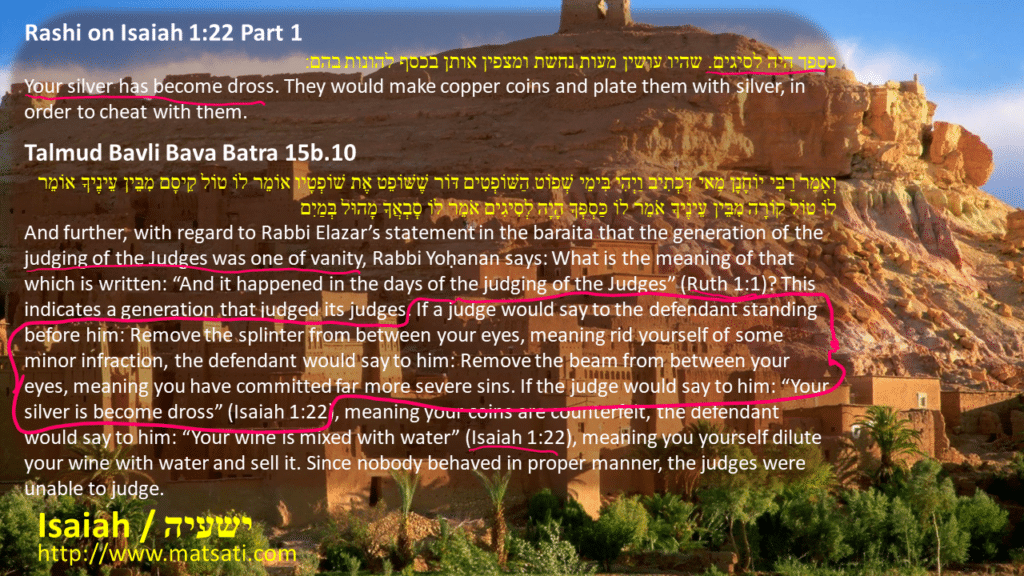
Rashi on Isaiah 1:22 Part 1
כספך היה לסיגים. שהיו עושין מעות נחשת ומצפין אותן בכסף להונות בהם:
Your silver has become dross. They would make copper coins and plate them with silver, in order to cheat with them.
Rashi describes these things via unjust scales (see Devarim / Deuteronomy 25:13-16) saying that the people made coins and plated them with silver. Solomon said in Mishley / Proverbs 11:1 Dishonest scales are an abomination to the LORD, but an accurate weight is His delight. (NIV) This teaches us that God hates deceitfulness and deception of any kind when it comes to business transactions. Remember what Yeshua told us, “Let your light so shine before men, that they may see your good deeds and praise your Father in heaven.” (Matthew 5:16) He teaches us that maasim tovim (good deeds), doing what is right, being honest and forthright is a testimony to this evil world around us, and it will lead to people giving glory and praise to God. The Rabbis of the Talmud discuss these things in the following way.
Talmud Bavli Bava Batra 15b.10
וְאָמַר רַבִּי יוֹחָנָן מַאי דִּכְתִיב וַיְהִי בִּימֵי שְׁפוֹט הַשּׁוֹפְטִים דּוֹר שֶׁשּׁוֹפֵט אֶת שׁוֹפְטָיו אוֹמֵר לוֹ טוֹל קֵיסָם מִבֵּין עֵינֶיךָ אוֹמֵר לוֹ טוֹל קוֹרָה מִבֵּין עֵינֶיךָ אֹמֵר לוֹ כַּסְפְּךָ הָיָה לְסִיגִים אֹמֵר לוֹ סׇבְאֲךָ מָהוּל בְּמַיִם
And further, with regard to Rabbi Elazar’s statement in the baraita that the generation of the judging of the Judges was one of vanity, Rabbi Yoḥanan says: What is the meaning of that which is written: “And it happened in the days of the judging of the Judges” (Ruth 1:1)? This indicates a generation that judged its judges. If a judge would say to the defendant standing before him: Remove the splinter from between your eyes, meaning rid yourself of some minor infraction, the defendant would say to him: Remove the beam from between your eyes, meaning you have committed far more severe sins. If the judge would say to him: “Your silver is become dross” (Isaiah 1:22), meaning your coins are counterfeit, the defendant would say to him: “Your wine is mixed with water” (Isaiah 1:22), meaning you yourself dilute your wine with water and sell it. Since nobody behaved in proper manner, the judges were unable to judge.
In this discussion, the rabbis provide examples of dishonesty and one bringing another before the court, where both people are so corrupt that the judge is unable to make a judgment. This discussion reminds us of something Yeshua taught according to Matthew 7:1 Judge not, that ye be not judged. 7:2 For with what judgment ye judge, ye shall be judged: and with what measure ye mete, it shall be measured to you again. 7:3 And why beholdest thou the mote that is in thy brother’s eye, but considerest not the beam that is in thine own eye? 7:4 Or how wilt thou say to thy brother, Let me pull out the mote out of thine eye; and, behold, a beam is in thine own eye? 7:5 Thou hypocrite, first cast out the beam out of thine own eye; and then shalt thou see clearly to cast out the mote out of thy brother’s eye. (KJV) The point that Yeshua is making is do not judge others until you are prepared to be judged by the same standard! This is the parallel to the faithful city that had become corrupt and full of murders, their silver has become like dross. The examples given in Isaiah 1 are very illustrative of this principle. Note that Yeshua was not saying we are not to judge others, but that we are to do it in humility and humbleness of heart. Note how Yeshua says in Matthew 7:2, you will be treated as you have treated others. The standard that is being used should not be hypocritical, and most likely is a speck in the eye of your neighbor as compared to the log in your own eye! The point is by recognizing the weakness in others, we should not judge as forgetting that we are to help our brother walk in freedom (1 Corinthians 5:12). However, how is it possible to help another person without being free ourselves? We must first look honestly at our own lives and then consider the judgement that we are contemplating. We are to consider exercising the same judgment toward ourselves. This follows through from the Targum translation of Isaiah, which states according to Isaiah 1:23-24, רַברְבַך מָרָדִין וְשוּתָפִין לְגַנָבִין כוּלְהֹון רָחְמִין לְקַבָלָא שוּחדָא אָמְרִין גְבַר לְחַברֵיה עְבֵיד לִי בְדִינִי דַאְשַלֵים לָך בְדִינָך דִין יַתמָא לָא דָיְנִין וּקבִילַת אַרמַלתָא לָא עַלָא לִקדָמֵיהֹון׃ 1:23 Thy princes are rebellious, and companions of thieves: all of them love gifts. One saith to the other, Show me kindness in my cause, and I will repay thee in thy cause. The fatherless they judge not, and the cry of the widow does not come before them. בְכֵין אְמַר רִבֹון עָלְמָא יוי צְבָאֹות תַקִיפָא דְיִשׂרָאֵל קַרתָא יְרוּשלַם אְנָא עֲתִיד לְנַחָמוּתַה בְרַם וָי לְרַשִיעַיָא כַד אַתגְלִי לְמַעְבַד פֹורעָנוּת דִין מִסָנְאֵי עַמָא וַאְתֵיב נִקמָא לִבעֵיל דְבָבָא׃ 1:24 Therefore saith the Lord of the world, the Lord of hosts, the Mighty One of Israel, The city of Jerusalem, I will comfort her; but woe to the wicked, when I shall reveal myself, to render just recompense to the enemies of my people, and render vengeance to my enemies. (TgJ) Here Justice is warped via bribery (money). This warped way of thinking “Show me kindness in my cause, and I will repay thee in thy cause” seems to have this flavor of mercy and justice, but underlying issue is that justice is perverted through bribery, which is the kindness spoken of here. This is the end result, “The fatherless they judge not, and the cry of the widow does not come before them” as justice is not served and those who are weak are taken advantage of! It is at this point that the cry of the innocent reaches heaven and God moves to bring justice and the destruction of the wicked! There may be an outward appearance of righteousness, but the underlying evil within corrupts everything. Consider in first century Judaism, the Pharisee was the picture of moral integrity as teachers of the Torah. In fact, Yeshua used the Pharisee as a standard saying that unless your righteousness exceeds the righteousness of the scribes and Pharisees you will in no way enter into the kingdom of heaven. (Matthew 5:20) The point is the faithful servant of God will see himself accurately as he sees others. He will recognize his own shortcomings, his own sinfulness, and his own need for the mercy of God! This is the trailing thoughts of the Targum, the mercy of God speaks saying, “The city of Jerusalem, I will comfort her; but woe to the wicked, when I shall reveal myself, to render just recompense to the enemies of my people, and render vengeance to my enemies.” Here the Lord God doesn’t just show mercy to His people, but also is the one who exacts judgment against their enemies. This is consistent with what the Torah states, Devarim / Deuteronomy 31:8 And the LORD, He is the One who goes before you. He will be with you, He will not leave you nor forsake you; do not fear nor be dismayed. (NKJV) (see also, Bereshit / Genesis 28:15, Shemot / Exodus 13:21, 33:14, Devarim / Deuteronomy 4:31, 20:1, 31:6, 1 Chronicles 29:20, Hebrews 13:5, etc)
Isaiah speaks of the mercy of God to cause His people to turn back to Him. But notice how this is the Lord God of Israel working in the hearts of the people saying the following, וַאְתֵיב מַחַת גְבוּרְתִי עֲלַך וַאְבָרֵיר כְמָא דִמנַקַן בְבֹורִיתָא כָל רַשִיעַך וְאַעדֵי כָל חַיָיבַך׃ 1:25 And I will turn the blow of my might upon thee; and I will scour away all the wicked, as he that is scouring with soap, and take away all thy sin. (TgJ) The analogy is to wash with soap to wash away the filth of sin, and this begins by removing the wicked from their midst. With the removal of the wicked and the return of the people to the Lord, justice prevails, and God will call men to bring justice back saying the following, וַאְמַנֵי בִיך דַיָינֵי קוּשטָא תָקְנִין כִיד בְקַדמֵיתָא וּמָלְכֵי מִלכַך כִיד מִן אַולָא בָתַר כֵין יִתקְרֵי לִיך קַרתָא דְקוּשטָא קַרתָא מְהֵימַנתָא׃ 1:26 And I will appoint in thee judges of truth, upright ones, as at the first, and thy counsellors, as at the beginning: afterward thou shalt be called the holy city, the faithful city. צִיֹון בִדיִתעְבֵיד בַה דִינָא תִתפְרֵיק וְדַעְבַדוּ אֹורָיתָא יְתוּבוּן לַה בְזָכוּ׃ 1:27 As for Zion, when justice shall be practised in her, she shall be redeemed; and those that do the law shall return to her in righteousness. (TgJ) This speaks to the mercy of God and Shuva Yisrael, meaning “Return O Israel” unto the Lord your God, for you have stumbled in your iniquity. (Hosea 13) There was still hope for Ephraim if they would turn away from their idols, confess their sins, and call upon the Name of the LORD. The Targum translates Isaiah saying, וְיִתַברוּן מָרָדִין וְחַיָיבִין כַחדָא וְדִשבַקוּ אֹורָיתָא דַיוי יִשתֵיצֹון׃ 1:28 The rebels and the sinners shall be broken together; and those that forsake the law of the Lord shall be destroyed. (TgJ) Note how there is no other option, living in a state of wickedness and unrighteousness is unacceptable. We are called to righteousness, holiness, justice, and truth regardless of what people or race we are from! The Lord God Almighty seeks that all people would repent and then the Lord God would heal their land. This truth is borne out according to the Torah! When the Lord God commanded Israel to conquer the Land of Canaan, he told them to devote every person in the cities to utter destruction at the edge of the sword.
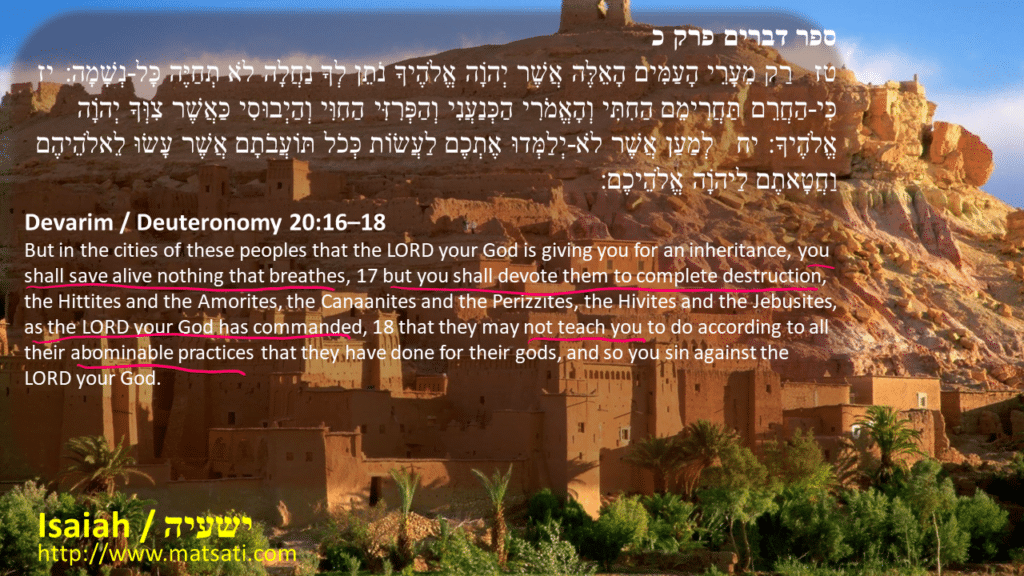
ספר דברים פרק כ
טז רַק מֵעָרֵי הָעַמִּים הָאֵלֶּה אֲשֶׁר יְהוָֹה אֱלֹהֶיךָ נֹתֵן לְךָ נַחֲלָה לֹא תְחַיֶּה כָּל-נְשָׁמָה: יז כִּי-הַחֲרֵם תַּחֲרִימֵם הַחִתִּי וְהָאֱמֹרִי הַכְּנַעֲנִי וְהַפְּרִזִּי הַחִוִּי וְהַיְבוּסִי כַּאֲשֶׁר צִוְּךָ יְהוָֹה אֱלֹהֶיךָ: יח לְמַעַן אֲשֶׁר לֹא-יְלַמְּדוּ אֶתְכֶם לַעֲשֹוֹת כְּכֹל תּוֹעֲבֹתָם אֲשֶׁר עָשֹוּ לֵאלֹהֵיהֶם וַחֲטָאתֶם לַיהוָֹה אֱלֹהֵיכֶם:
Devarim / Deuteronomy 20:16–18
But in the cities of these peoples that the LORD your God is giving you for an inheritance, you shall save alive nothing that breathes, 17 but you shall devote them to complete destruction, the Hittites and the Amorites, the Canaanites and the Perizzites, the Hivites and the Jebusites, as the LORD your God has commanded, 18 that they may not teach you to do according to all their abominable practices that they have done for their gods, and so you sin against the LORD your God.
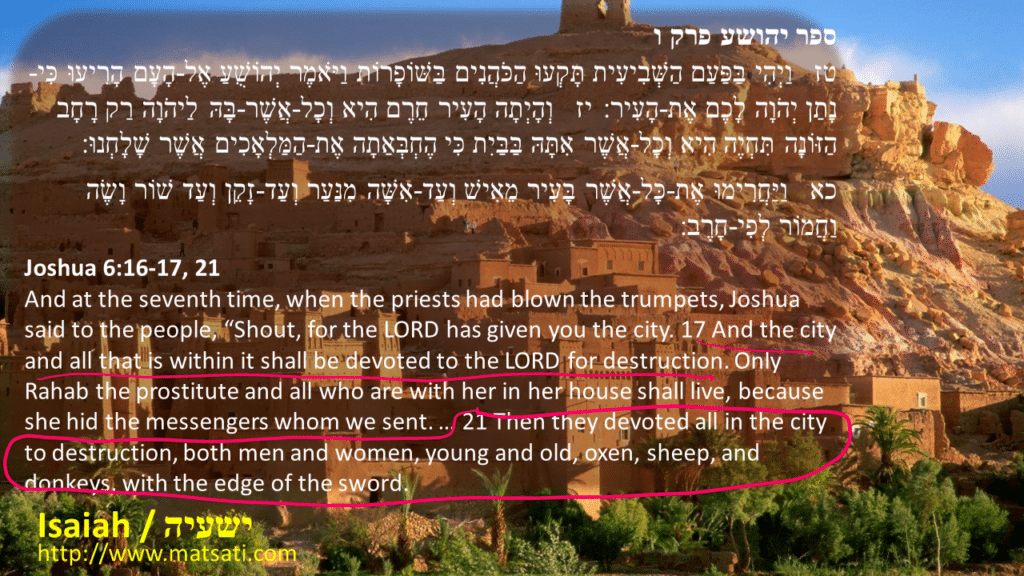
ספר יהושע פרק ו
טז וַיְהִי בַּפַּעַם הַשְּׁבִיעִית תָּקְעוּ הַכֹּהֲנִים בַּשּׁוֹפָרוֹת וַיֹּאמֶר יְהוֹשֻׁעַ אֶל-הָעָם הָרִיעוּ כִּי-נָתַן יְהֹוָה לָכֶם אֶת-הָעִיר: יז וְהָיְתָה הָעִיר חֵרֶם הִיא וְכָל-אֲשֶׁר-בָּהּ לַיהֹוָה רַק רָחָב הַזּוֹנָה תִּחְיֶה הִיא וְכָל-אֲשֶׁר אִתָּהּ בַּבַּיִת כִּי הֶחְבְּאַתָה אֶת-הַמַּלְאָכִים אֲשֶׁר שָׁלָחְנוּ: כא וַיַּחֲרִימוּ אֶת-כָּל-אֲשֶׁר בָּעִיר מֵאִישׁ וְעַד-אִשָּׁה מִנַּעַר וְעַד-זָקֵן וְעַד שׁוֹר וָשֶֹה וַחֲמוֹר לְפִי-חָרֶב:
Joshua 6:16-17, 21
And at the seventh time, when the priests had blown the trumpets, Joshua said to the people, “Shout, for the LORD has given you the city. 17 And the city and all that is within it shall be devoted to the LORD for destruction. Only Rahab the prostitute and all who are with her in her house shall live, because she hid the messengers whom we sent. … 21 Then they devoted all in the city to destruction, both men and women, young and old, oxen, sheep, and donkeys, with the edge of the sword.
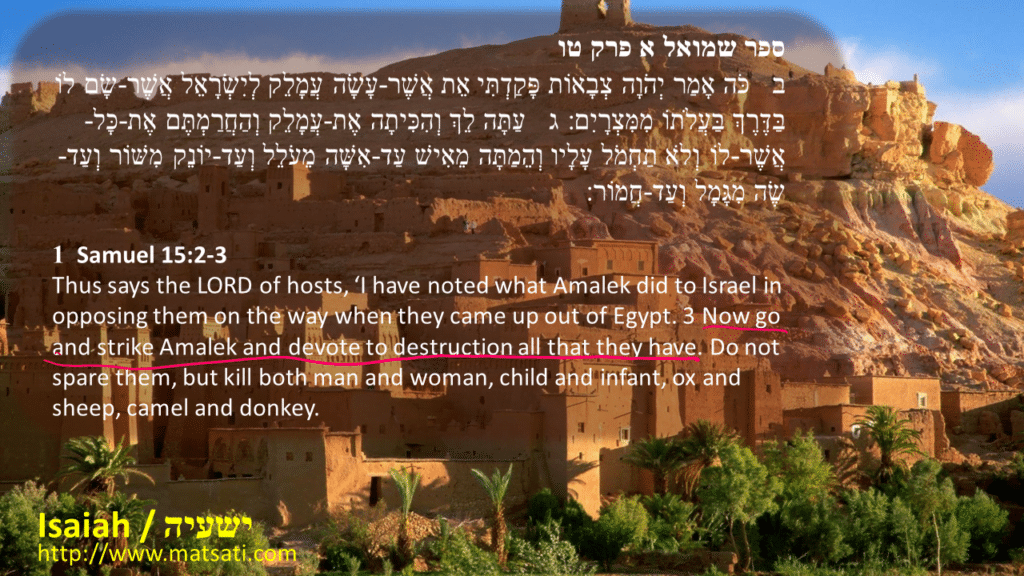
ספר שמואל א פרק טו
ב כֹּה אָמַר יְהֹוָה צְבָאוֹת פָּקַדְתִּי אֵת אֲשֶׁר-עָשָֹה עֲמָלֵק לְיִשְֹרָאֵל אֲשֶׁר-שָֹם לוֹ בַּדֶּרֶךְ בַּעֲלֹתוֹ מִמִּצְרָיִם: ג עַתָּה לֵךְ וְהִכִּיתָה אֶת-עֲמָלֵק וְהַחֲרַמְתֶּם אֶת-כָּל-אֲשֶׁר-לוֹ וְלֹא תַחְמֹל עָלָיו וְהֵמַתָּה מֵאִישׁ עַד-אִשָּׁה מֵעֹלֵל וְעַד-יוֹנֵק מִשּׁוֹר וְעַד-שֶֹה מִגָּמָל וְעַד-חֲמוֹר:
1 Samuel 15:2-3
Thus says the LORD of hosts, ‘I have noted what Amalek did to Israel in opposing them on the way when they came up out of Egypt. 3 Now go and strike Amalek and devote to destruction all that they have. Do not spare them, but kill both man and woman, child and infant, ox and sheep, camel and donkey.
These passages speak of the destruction that God had called Israel to inflict upon the nations that lived in the land of Canaan. One might ask why would God allow such a violent thing to happen by his own permission? The reason was due to the wickedness of these nations. It was God’s gracious mercy that gave these nations over 400 years to repent of their sins! (Bereshit / Genesis 15:13-16) Consider how much time that is, spanning multiple lifetimes! Note again what the Torah states:
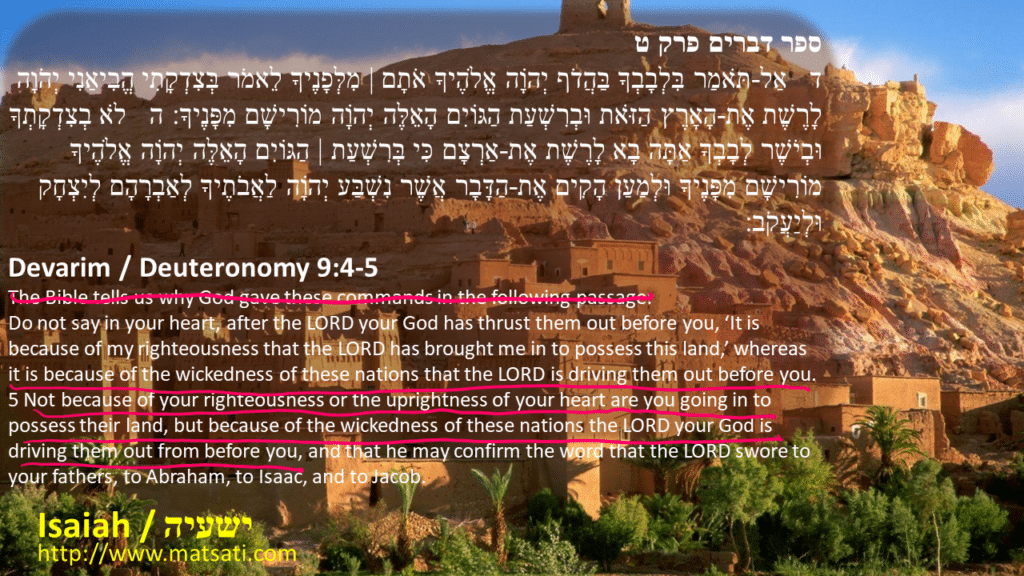
ספר דברים פרק ט
ד אַל-תֹּאמַר בִּלְבָבְךָ בַּהֲדֹף יְהוָֹה אֱלֹהֶיךָ אֹתָם | מִלְּפָנֶיךָ לֵאמֹר בְּצִדְקָתִי הֱבִיאַנִי יְהֹוָה לָרֶשֶׁת אֶת-הָאָרֶץ הַזֹּאת וּבְרִשְׁעַת הַגּוֹיִם הָאֵלֶּה יְהוָֹה מוֹרִישָׁם מִפָּנֶיךָ: ה לֹא בְצִדְקָתְךָ וּבְיֹשֶׁר לְבָבְךָ אַתָּה בָא לָרֶשֶׁת אֶת-אַרְצָם כִּי בְּרִשְׁעַת | הַגּוֹיִם הָאֵלֶּה יְהוָֹה אֱלֹהֶיךָ מוֹרִישָׁם מִפָּנֶיךָ וּלְמַעַן הָקִים אֶת-הַדָּבָר אֲשֶׁר נִשְׁבַּע יְהוָֹה לַאֲבֹתֶיךָ לְאַבְרָהָם לְיִצְחָק וּלְיַעֲקֹב:
Devarim / Deuteronomy 9:4-5
The Bible tells us why God gave these commands in the following passage:
Do not say in your heart, after the LORD your God has thrust them out before you, ‘It is because of my righteousness that the LORD has brought me in to possess this land,’ whereas it is because of the wickedness of these nations that the LORD is driving them out before you. 5 Not because of your righteousness or the uprightness of your heart are you going in to possess their land, but because of the wickedness of these nations the LORD your God is driving them out from before you, and that he may confirm the word that the LORD swore to your fathers, to Abraham, to Isaac, and to Jacob.
We note that it was not because of Israel’s righteousness that the nations were being destroyed. It was because of their wickedness. The Torah does not leave us in a vacuum concerning their sins either. The Lord God Almighty goes into detail in the Torah to describe the sins of the people, the reasons why they are being destroyed. Note that the Lord God did not just decide to command the Israelites to destroy all the inhabitants of Canaan simply because he promised Abraham that his descendants would inherit the Land. He commanded them to do this because the Canaanites were wicked, evil, full of murders, a sinful people. The Torah describes these things according to Vayikra / Leviticus 18:6, 18:19-25 and Devarim / Deuteronomy 18:9-13, to name a couple places. These passages speak of the evil things the nations do and make sin a way of life, such as incest, adultery, bestiality, homosexual relations, sorcery, divination, necromancy, murders, and child sacrifice. These passages reveal to us the weightiness of their sins. The Lord God commanded those who practice these things to be destroyed so the people of Israel would not learn to do the same. These things were put in the Scriptures so that we too could learn and receive a warning to not become like these nations. (see 1 Corinthians 10 on exposition on why the Torah was written for us today.) Note that these commands are related to judgment. This is the very thing that Isaiah is warning his people and us today when he said, וְיִתַברוּן מָרָדִין וְחַיָיבִין כַחדָא וְדִשבַקוּ אֹורָיתָא דַיוי יִשתֵיצֹון׃ 1:28 The rebels and the sinners shall be broken together; and those that forsake the law of the Lord shall be destroyed. (TgJ) We note that God is merciful and patient in waiting illustrated by the length of time waiting on man to turn from his sins. Again, God is patient and merciful, remember the story of Jonah when the people of Nineveh were given the chance to repent of their sins, they did, and so God had mercy on them and spared them of punishment. (see Jonah 3:1–5, 10) The rabbis go on to say the following concerning Isaiah 1:28.
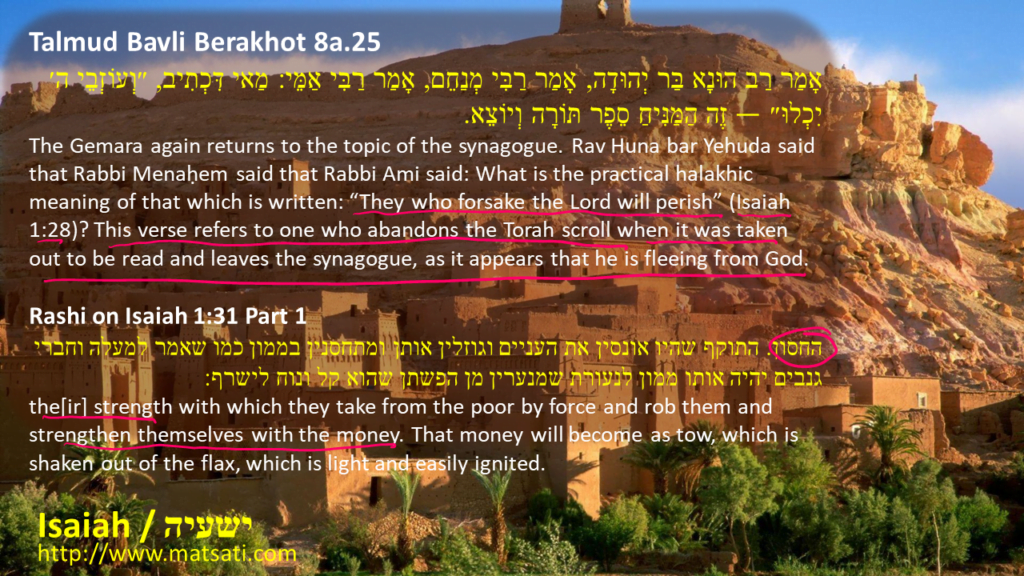
Talmud Bavli Berakhot 8a.25
אָמַר רַב הוּנָא בַּר יְהוּדָה, אָמַר רַבִּי מְנַחֵם, אָמַר רַבִּי אַמֵּי: מַאי דִּכְתִיב, ״וְעוֹזְבֵי ה׳ יִכְלוּ״ — זֶה הַמַּנִּיחַ סֵפֶר תּוֹרָה וְיוֹצֵא.
The Gemara again returns to the topic of the synagogue. Rav Huna bar Yehuda said that Rabbi Menaḥem said that Rabbi Ami said: What is the practical halakhic meaning of that which is written: “They who forsake the Lord will perish” (Isaiah 1:28)? This verse refers to one who abandons the Torah scroll when it was taken out to be read and leaves the synagogue, as it appears that he is fleeing from God.
The rabbis connect the abandoning of the Lord to the turning from God’s Torah. The extent of this is as when the Torah is read in the synagogue, when the Torah scroll is retrieved, a person leaves in an apparent fleeing from the Lord, and from hearing His word. This parallels to the one who doesn’t want to hear the Bible read, who is not interested in God’s Word and would rather do something else as opposed to spending time with God. There are so many applications to what Isaiah 1:28 is saying, and what our response should be!
The Targum explicitly states that the oaks, the gardens were the place of idolatry according to Isaiah 1:29, אְרֵי תִבַהתוּן מֵאִילָנֵי טָעְוָתָא דְחַמֵידתוּן וְתִתכַנעוּן מִגִנֵיאַך טָעְוָתָא דְאַתוּן מִסתַיְעִין בְהֹון׃ 1:29 For ye shall be confounded of the oaks of idolatry which ye have desired; and ye shall be ashamed of the gardens of idolatry in which ye were seeking help. אְרֵי תְהֹון כְבוּטמָא דִבמִתַר טַרפֹוהִי וּכגִינַת שִקיָא דְמַיִין לֵית לַה׃ 1:30 For ye shall be as an oak whose leaf fadeth, and as a watered garden that hath no water. (TgJ) We note this is how we understand the meaning of the מֵאֵילִ֖ים which has the meaning of “large tree” providing a picture of the groves which Israel sinned against God in the gardens. Isaiah 1:31 the Targum translates saying, וִיהֵי תוּקפְהֹון דְרַשִיעַיָא כְנָעֹורַת כִתָנָא וְעֹובָד יְדֵיהֹון כְנִיצֹוץ נוּרָא כְמָא דִמקָרְבִין דֵין לִסטַר דֵין וְדָלְקִין תַרוֵיהֹון כַחדָא כֵין יְסוּפוּן רַשִיעַיָא אִנוּן וְעֹובַדֵיהֹון בִישַיָא וְלָא יְהֵי עְלֵיהֹון חְיָס׃ 1:31 The strength of the wicked shall be as tow of flax, and the work of their hand as a spark of fire, when one approaches to the side of the other, both are burning together: thus the wicked shall be consumed, they and their evil works, and none shall have pity upon them. (TgJ) Note how Jonhathan describes the wicked, their works are like a spark of fire. In the textile industry, a tow is a coarse, broken fibre, removed during processing of flax, hemp, or jute and separated from the shives. Flax tows are often used as upholstery stuffing and oakum. Tows in general are frequently cut up to produce staple fibre. In this case here tow is used to kindle a fire as it is very light, thin, and capable of catching fire very easily. So when one draws near, the spark of fire, the works of wickedness, will cause an unstoppable fire. The reason it is unstoppable is that once tow has caught fire, it will burn up very fast, almost instantaneously providing the imagery of no way to escape! Rashi states the following concerning these things:
Rashi on Isaiah 1:31 Part 1
החסון. התוקף שהיו אונסין את העניים וגוזלין אותן ומתחסנין בממון כמו שאמר למעלה וחברי גנבים יהיה אותו ממון לנעורת שמנערין מן הפשתן שהוא קל ונוח לישרף:
the[ir] strength with which they take from the poor by force and rob them and strengthen themselves with the money. That money will become as tow, which is shaken out of the flax, which is light and easily ignited.
Notice how Rashi describes the strength of the wicked, as robbing the poor and adding the wealth to their own. This kind of increase is dishonest and he says it will be shaken out and lost quickly. In Parashat Kedoshim (Vayikra / Leviticus 19:1-20:27) the Lord God Almighty lays out the framework for a life of honest business dealings. The mitzvot (commandments) cover topics such as falsely denying money owed, lying for monetary benefit, and swearing falsely to support illegitimate monetary claims. However, in guiding man to a life of holiness, Parashat Kedoshim does not suffice with a general discussion of the need for honest monetary dealings, but goes into very specific requirements. One mitzvah in particular (19:15) speaks of not performing iniquity in judgment. The Torah repeats a prohibition mentioned earlier but under a different context. Previously the mitzvah was in relation to a judge, and here to a businessman.
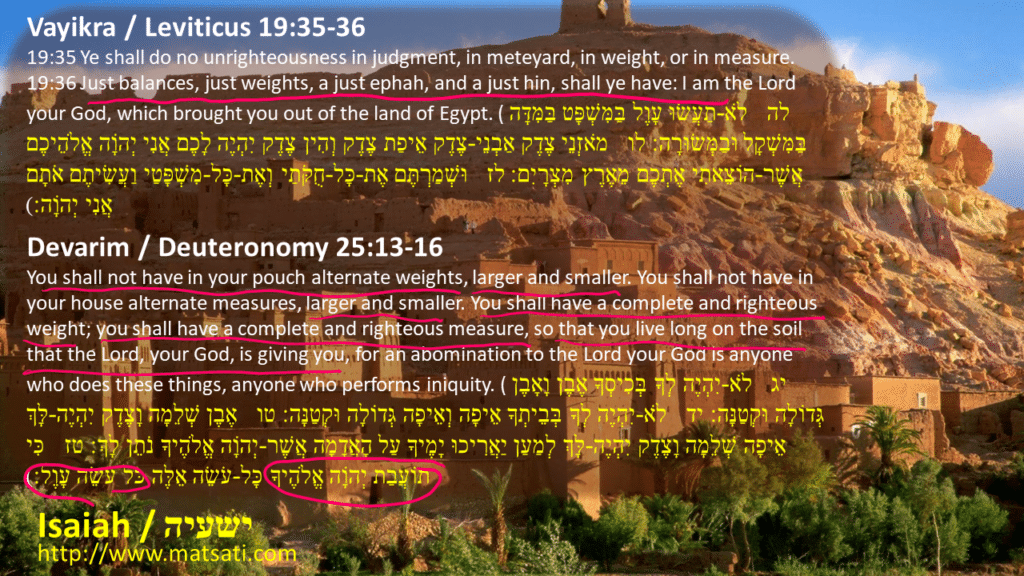
Vayikra / Leviticus 19:35-36
19:35 Ye shall do no unrighteousness in judgment, in meteyard, in weight, or in measure. 19:36 Just balances, just weights, a just ephah, and a just hin, shall ye have: I am the Lord your God, which brought you out of the land of Egypt. (לה לֹא-תַעֲשֹוּ עָוֶל בַּמִּשְׁפָּט בַּמִּדָּה בַּמִּשְׁקָל וּבַמְּשֹוּרָה: לו מֹאזְנֵי צֶדֶק אַבְנֵי-צֶדֶק אֵיפַת צֶדֶק וְהִין צֶדֶק יִהְיֶה לָכֶם אֲנִי יְהוָֹה אֱלֹהֵיכֶם אֲשֶׁר-הוֹצֵאתִי אֶתְכֶם מֵאֶרֶץ מִצְרָיִם: לז וּשְׁמַרְתֶּם אֶת-כָּל-חֻקֹּתַי וְאֶת-כָּל-מִשְׁפָּטַי וַעֲשִֹיתֶם אֹתָם אֲנִי יְהוָֹה:)
These verses speak against a perversion of justice in the weights and measures. The importance of this verse is illustrated in Rashi’s commentary on Isaiah 1:31. Like what it says according to Devarim / Deuteronomy 25:13-16.
Devarim / Deuteronomy 25:13-16
You shall not have in your pouch alternate weights, larger and smaller. You shall not have in your house alternate measures, larger and smaller. You shall have a complete and righteous weight; you shall have a complete and righteous measure, so that you live long on the soil that the Lord, your God, is giving you, for an abomination to the Lord your God is anyone who does these things, anyone who performs iniquity. (יג לֹא-יִהְיֶה לְךָ בְּכִיסְךָ אֶבֶן וָאָבֶן גְּדוֹלָה וּקְטַנָּה: יד לֹא-יִהְיֶה לְךָ בְּבֵיתְךָ אֵיפָה וְאֵיפָה גְּדוֹלָה וּקְטַנָּה: טו אֶבֶן שְׁלֵמָה וָצֶדֶק יִהְיֶה-לָּךְ אֵיפָה שְׁלֵמָה וָצֶדֶק יִהְיֶה-לָּךְ לְמַעַן יַאֲרִיכוּ יָמֶיךָ עַל הָאֲדָמָה אֲשֶׁר-יְהוָֹה אֱלֹהֶיךָ נֹתֵן לָךְ: טז כִּי תוֹעֲבַת יְהוָֹה אֱלֹהֶיךָ כָּל-עֹשֵֹה אֵלֶּה כֹּל עֹשֵֹה עָוֶל:)
We get a repetition of the requirement for just or honest weights and measures here in Devarim / Deuteronomy. The promise for obedience to having honest weights and measures is to have a long life. Notice there is a similar promise to those who honor their parents! The description of those who break this command being dishonest as being abominations to the Lord. This is why Isaiah says that these types of people will be destroyed or burned up due to their sins. Dishonest scales are an abomination to the Lord as Solomon expressed the same according to Mishley / Proverbs 11:1. The issue is that these people are using trickery and deception to steal from others. This behavior has the outcome of even destroying a life, causing people to be so poor they can’t afford to survive, they die. This could also be one of the reasons Isaiah claims there are murders in these peoples according to Isaiah 1:21. The reason why the inhabitants were about to be destroyed was because they lived in unrepentant sin. They led others to serve false gods, and they had been warned for many years and they would not heed God’s call to repent and turn from their sin. The reason this happened is according to what we read in the book of Judges. 3:4 And they were to prove Israel by them, to know whether they would hearken unto the commandments of the LORD, which he commanded their fathers by the hand of Moses. 3:5 And the children of Israel dwelt among the Canaanites, Hittites, and Amorites, and Perizzites, and Hivites, and Jebusites: 3:6 And they took their daughters to be their wives, and gave their daughters to their sons, and served their gods. 3:7 And the children of Israel did evil in the sight of the LORD, and forget the LORD their God, and served Baalim and the groves. (Judges 3:4-7) So the people abandoned the Lord, the God of their fathers, and bowed down to false gods, all of which led to Isaiah and His prophetic words to a people who are about to perish.
